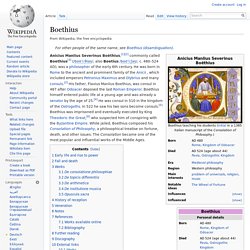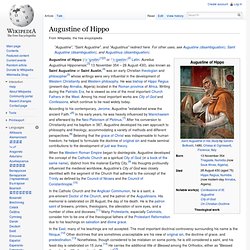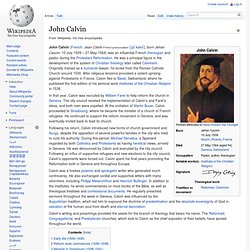

Anselm of Canterbury. Saint Anselm of Canterbury (/ˈænsɛlm/; c. 1033 – 21 April 1109), also called Anselm of Aosta for his birthplace, and Anselm of Bec for his home monastery, was a Benedictine monk, philosopher, and prelate of the Church, who held the office of Archbishop of Canterbury from 1093 to 1109. Peter Abelard. Peter Abelard (/ˈæb.ə.lɑːrd/; Latin: Petrus Abaelardus or Abailardus; French: Pierre Abélard, pronounced: [a.beˈlaːʁ]; 1079 – 21 April 1142) was a medieval French scholastic philosopher, theologian and preeminent logician.[1] He was also a composer.
His affair with and love for Héloïse d'Argenteuil has become legendary. Boethius. Early life and rise to power[edit] On account of his erudition, Boethius entered the service of Theodoric the Great.

His earliest documented acts on behalf of the Ostrogothic ruler were to investigate allegations that the paymaster of Theodoric's bodyguards had debased the coins of their pay, to produce a waterclock for Theodoric to give to king Gundobad of the Burgunds, and to recruit a lyre-player to perform for Clovis king of the Franks.[10] Bonaventure. Saint Bonaventure, O.F.M. (Italian: San Bonaventura; 1221 – 15 July 1274),[1] born Giovanni di Fidanza, was an Italian medieval scholastic theologian and philosopher. The seventh Minister General of the Order of Friars Minor, he was also a Cardinal Bishop of Albano. He was canonised on 14 April 1482 by Pope Sixtus IV and declared a Doctor of the Church in the year 1588 by Pope Sixtus V. He is known as the "Seraphic Doctor" (Latin: Doctor Seraphicus). Many writings believed in the Middle Ages to be his are now collected under the name Pseudo-Bonaventura. Duns Scotus. Augustine of Hippo.
In the Catholic Church and the Anglican Communion, he is a saint, a pre-eminent Doctor of the Church, and the patron of the Augustinians.

His memorial is celebrated on 28 August, the day of his death. He is the patron saint of brewers, printers, theologians, the alleviation of sore eyes, and a number of cities and dioceses.[11] Many Protestants, especially Calvinists, consider him to be one of the theological fathers of the Protestant Reformation due to his teachings on salvation and divine grace. In the East, many of his teachings are not accepted. Life[edit] Childhood and education[edit] At the age of 17, through the generosity of his fellow citizen Romanianus,[24] Augustine went to Carthage to continue his education in rhetoric. At about the age of 19, Augustine began an affair with a young woman in Carthage. Teaching rhetoric[edit] During the years 373 and 374, Augustine taught grammar at Thagaste.
Augustine won the job and headed north to take up his position in late 384. Confessions (St. Augustine) Confessions (Latin: Confessiones) is the name of an autobiographical work, consisting of 13 books, by St. Augustine of Hippo, written in Latin between AD 397 and AD 398. Modern English translations of it are sometimes published under the title The Confessions of St. Augustine in order to distinguish the book from other books with similar titles. Its original title was "Confessions in Thirteen Books," and it was composed to be read out loud with each book being a complete unit.[1] In the work St. His infancy and boyhood up to age 14.
At Image Books, trans. Thomas Aquinas. John Calvin. John Calvin (French: Jean Calvin French pronunciation: [ʒɑ̃ kalvɛ̃], born Jehan Cauvin: 10 July 1509 – 27 May 1564) was an influential French theologian and pastor during the Protestant Reformation.

He was a principal figure in the development of the system of Christian theology later called Calvinism. Originally trained as a humanist lawyer, he broke from the Roman Catholic Church around 1530. After religious tensions provoked a violent uprising against Protestants in France, Calvin fled to Basel, Switzerland, where he published the first edition of his seminal work Institutes of the Christian Religion in 1536. In that year, Calvin was recruited by William Farel to help reform the church in Geneva. The city council resisted the implementation of Calvin's and Farel's ideas, and both men were expelled. Martin Luther. Martin Luther OSA (German: [ˈmaɐ̯tiːn ˈlʊtɐ] ( ); 10 November 1483 – 18 February 1546) was a German monk, Catholic priest, professor of theology and seminal figure of the 16th-century movement in Christianity known later as the Protestant Reformation.[1] He strongly disputed the claim that freedom from God's punishment for sin could be purchased with monetary values.
He confronted indulgence salesman Johann Tetzel, a Dominican friar, with his Ninety-Five Theses in 1517. His refusal to retract all of his writings at the demand of Pope Leo X in 1520 and the Holy Roman Emperor Charles V at the Diet of Worms in 1521 resulted in his excommunication by the Pope and condemnation as an outlaw by the Emperor. Luther taught that salvation and subsequently eternity in heaven is not earned by good deeds but is received only as a free gift of God's grace through faith in Jesus Christ as redeemer from sin and subsequently eternity in Hell. Early life.